Does UK Income Protection Insurance Cover Maternity Costs?
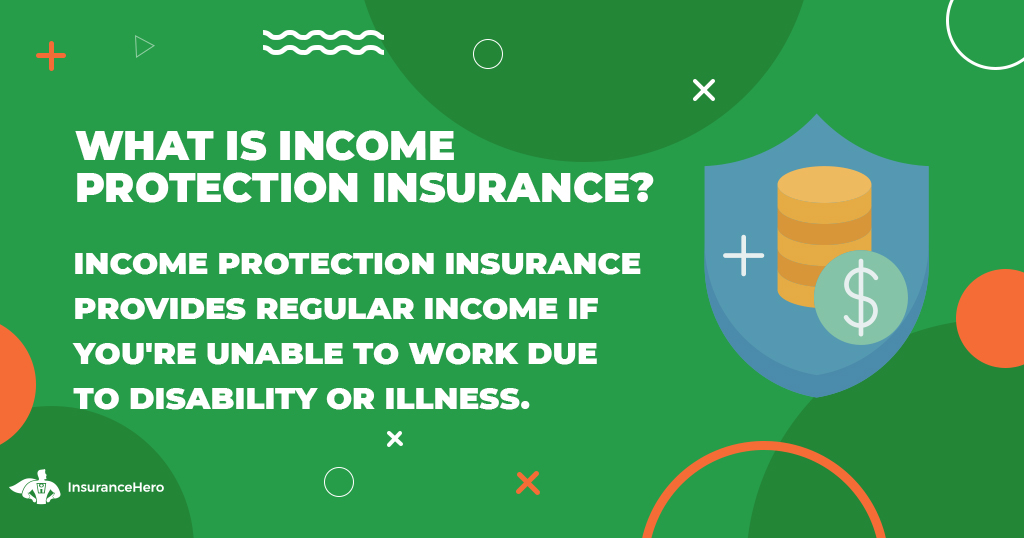
If you’ve just learned that your family is about to grow, there’s a good chance you’re filled with both tremendous excitement and a bit of worry, too.
One of the foremost questions on new parents’ minds is how they will handle the financial changes that come with a little one, including the costs during and after pregnancy.
In the UK, mothers who need to take time off to have a baby might be eligible for various NHS programmes, including Statutory Maternity Leave and Statutory Maternity Pay.
However, those who aren’t eligible or looking for additional financial help might wonder if income protection insurance will provide them with the support they need.
In this post, we’ll examine income protection insurance and whether you can expect it to cover maternity costs.
What Is Income Protection Insurance?
If you cannot work due to disability or sickness, income protection insurance pays you a regular income. You can continue receiving this income until you retire or return to work.
You’ll also hear that this type of insurance is permanent health insurance.
It’s worth noting that you won’t be able to receive the same amount of money through income protection insurance as you were making when you were still actively working.
In most cases, the amount of income you can claim will be about half to two-thirds of how much you were making from your job (before tax).
You also have to wait at least four weeks before you can claim income protection payments after you’ve become disabled or fallen ill.
At the same time, you can have payments start up to two years after you stopped receiving your regular income.
You might be able to claim statutory sick pay for a period of time, or your employer might give you sick pay.
This type of insurance is designed to help policyholders maintain their financial security and cover their everyday living expenses when they cannot earn an income from employment.
It’s worth noting that income protection insurance isn’t the same thing as critical illness insurance, which hands over a lump sum when policyholders are diagnosed with certain illnesses.
Critical illness insurance covers a narrower range of illnesses than income protection insurance and provides coverage for a shorter duration.
However, it’s less expensive than income protection insurance, and you might find that this is a better option if you’re looking for affordable illness insurance that provides some protection.
When Is It a Good Idea to Get Income Protection Insurance?
Income protection insurance can be a good investment for some, but others might find it unnecessary.
For example, it’s possible that you already get some income protection through your employer as a benefit.
You should be able to find more information about this in your employee handbook, employment contract or by talking to the personnel department.
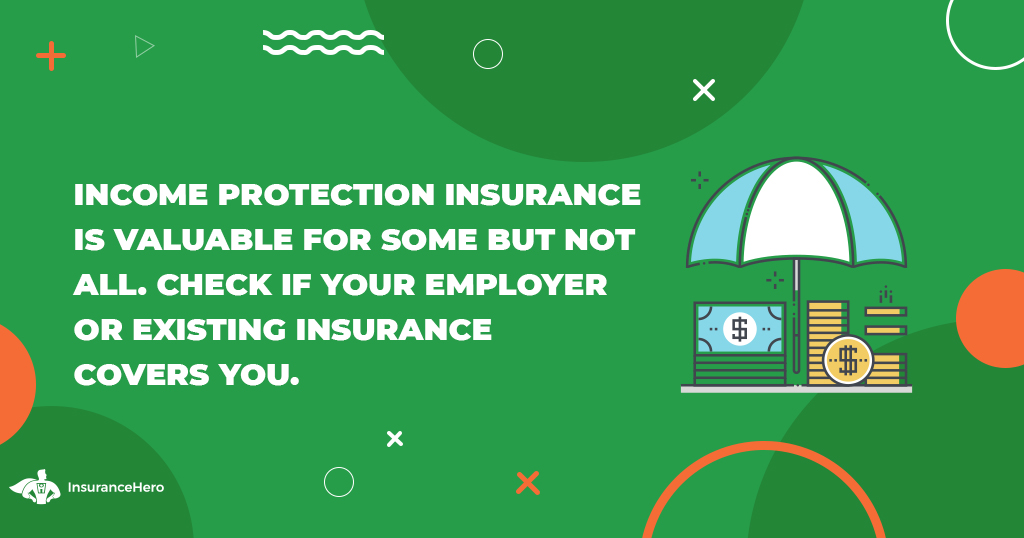
There’s also a chance that you are already covered in the case of a serious illness through another insurance policy you have.
Furthermore, if you have substantial savings that you could use to cover your living costs if you were to fall ill, you could potentially choose to avoid paying insurance premiums now and rely on your savings.
However, you’ll want to think very carefully about how long you could cover the cost of living and what options you would have if you remain ill for longer than your savings last.
Does UK Income Protection Insurance Cover Maternity Costs?
Income protection insurance is designed to help cover lost earnings resulting from an unforeseen event, such as a sudden illness, accident, or other injury.
Most insurers do not consider pregnancy an unforeseen event, and you will find that many policies have a list of exceptions outlining what won’t be covered under the policy. You’ll commonly find that “pregnancy” or “childbirth” are listed as exceptions.
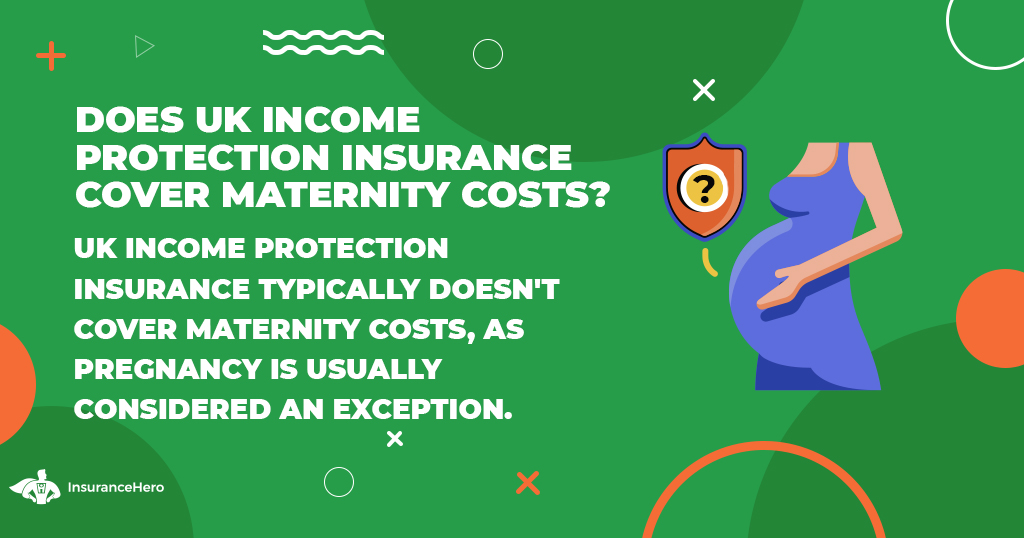
This means income protection typically does not cover maternity costs or expenses related to pregnancy and childbirth.
That being said, maternity-related expenses are usually covered by other types of insurance or healthcare services in the UK.
If you plan on taking out an income protection insurance policy and are concerned about whether it will cover maternity costs, you’ll want to look closely at the terms and conditions.
In most cases, you will find that pregnancy, childbirth, and maternity leave are listed as exclusions.
Do you already have income protection insurance and wonder how your pregnancy could affect your coverage?
Your policy will usually be temporarily placed on hold during your maternity leave. Once you return to work, your income protection policy can begin again.

Secure Your Child’s Future Today
Get a Free Income Protection Quote in Minutes and Ensure a Bright Future For Your Child – No Matter What
Click Now For A Free Quote >>What Types of Insurance Cover Maternity Costs in the UK?
In the UK, maternity care is primarily provided through the National Health Service (NHS), which offers comprehensive maternity services free of charge to residents and eligible individuals.
Maternity services in the UK are funded through general taxation, and pregnant women can access antenatal care, maternity hospital services, and postnatal care without the need for private insurance.
As a result, there is no specific need for private health insurance to cover maternity costs in the UK for routine, standard care.
The NHS covers the expenses associated with prenatal checkups, childbirth, and postnatal care.
This includes services provided by midwives, obstetricians, and other healthcare professionals throughout the pregnancy and childbirth.
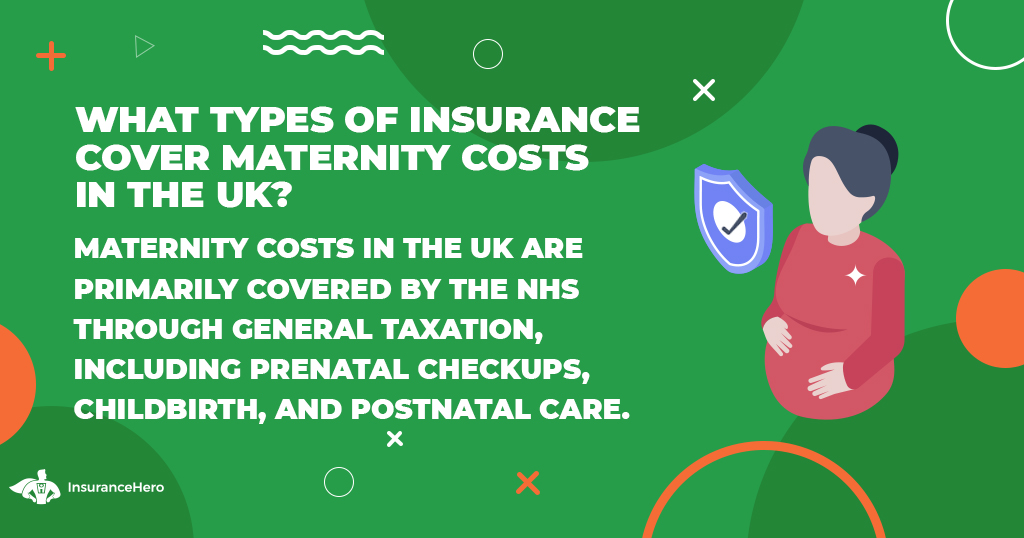
However, some individuals may purchase private health insurance for additional benefits or services not covered by the NHS.
Private health insurance policies in the UK can offer certain advantages, such as access to private hospitals, more choice in selecting a healthcare provider, and potential coverage for elective or non-standard procedures related to maternity care.
These policies can vary significantly in terms of coverage, cost, and available benefits, so it is essential to carefully review the terms and limitations of any private health insurance plan to determine what it includes regarding maternity care.
It is worth noting that private health insurance policies may have waiting periods, coverage limits, and exclusions for pre-existing conditions, including pregnancy.
Therefore, individuals considering private insurance for maternity care should thoroughly research their options and consult with insurance providers to understand the terms and costs involved.
For routine maternity care, the NHS remains the primary and cost-effective source of coverage for residents and eligible individuals in the UK.
What Is Statutory Maternity Pay?
Statutory Maternity Pay (SMP) in the United Kingdom is a financial benefit provided to eligible employees during and after their pregnancy.
SMP is designed to support pregnant women on maternity leave by providing a source of income during this period.
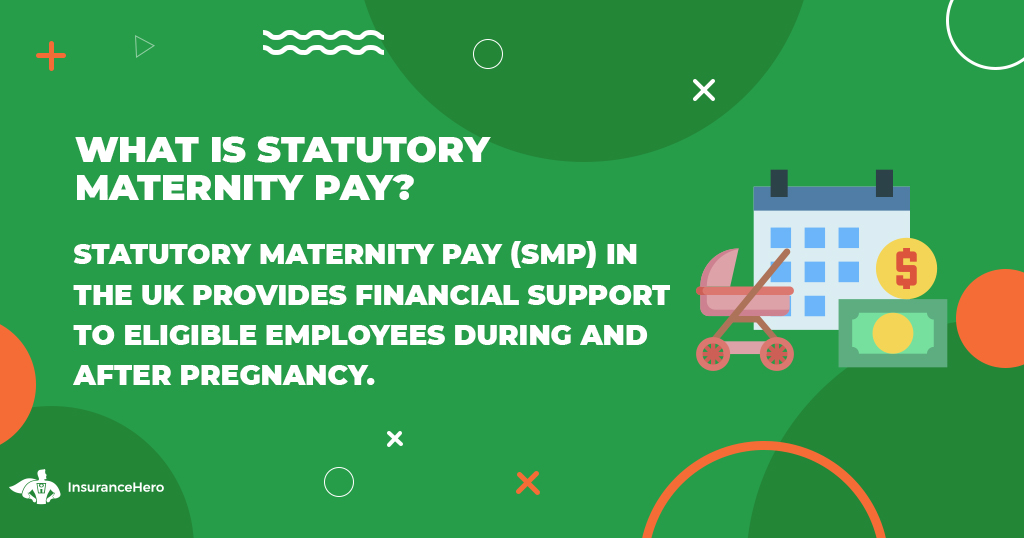
To qualify for SMP, an employee must meet certain criteria. This typically includes having worked for the same employer continuously for at least 26 weeks into the qualifying week (the 15th week before the expected week of childbirth).
The employee must also earn at least the lower earnings limit for National Insurance contributions.
The amount of SMP an eligible employee receives is typically 90% of their average weekly earnings for the first six weeks of maternity leave, followed by a flat rate (or 90% of average weekly earnings, whichever is lower) for the remaining 33 weeks.
The flat rate can change annually and is subject to income tax and National Insurance contributions.
SMP can be claimed for a maximum of 39 weeks. It can start as early as the 11th week before the expected week of childbirth. This allows for maternity leave both before and after the birth.
To claim SMP, the employee must inform their employer at least 15 weeks before the expected week of childbirth.
They must also provide medical evidence (such as a maternity certificate) confirming the pregnancy and expected due date.
What Is Maternity Allowance?
Maternity Allowance is a financial benefit provided by the government in the United Kingdom to eligible individuals who do not qualify for Statutory Maternity Pay (SMP) but still need financial support during their maternity leave.
It is designed to assist self-employed individuals, those without continuous employment with the same employer, or individuals who do not meet the earnings criteria for SMP.
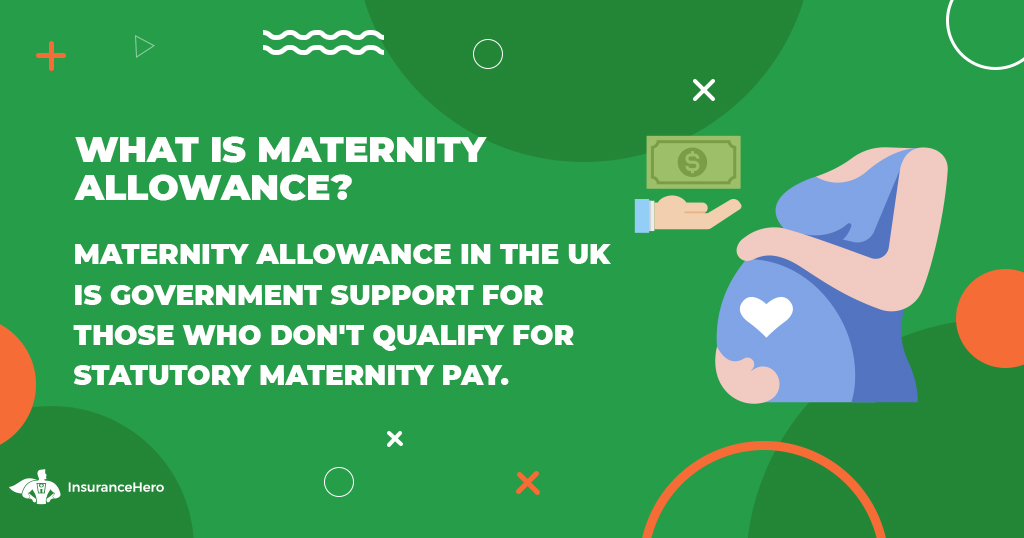
To be eligible for Maternity Allowance, an individual typically needs to meet the following criteria:
- Be pregnant or have given birth in the last 26 weeks.
- Have been employed or self-employed for at least 26 weeks in the 66 weeks leading up to the expected week of childbirth.
- Earned at least £30 a week on average in at least 13 of the 66 weeks leading up to the expected week of childbirth.
The amount of Maternity Allowance can vary depending on individual circumstances. In general, eligible individuals may receive Maternity Allowance at one of two rates:
- Standard Rate: This rate is typically paid to those who have paid enough National Insurance contributions. As of my last knowledge update in September 2021, the standard weekly rate was £151.97 or 90% of the average weekly earnings, whichever is lower.
- Lower Rate: Some individuals who do not meet the earnings threshold for the standard rate may be eligible for the lower rate. As of my last update, the lower rate was £27 per week.
To claim Maternity Allowance, individuals can apply through their local Jobcentre Plus or use the relevant government forms available on the official UK government website.
The application process often requires evidence of pregnancy, earnings, and employment history.
What Types of Private Insurance Cover Pregnancy and Maternity Costs in the UK?
Most people rely on the NHS to provide financial support before and after birth. However, a private medical insurance policy can provide access to private healthcare services before your child is born.
That said, most of these policies only cover emergencies and complications. Some policies provide a cash payout known as a pregnancy benefit, childbirth benefit, or maternity cash benefit.
Private Maternity Insurance
Some private health insurance policies in the UK offer specific maternity insurance as an add-on or as part of a comprehensive health insurance plan.
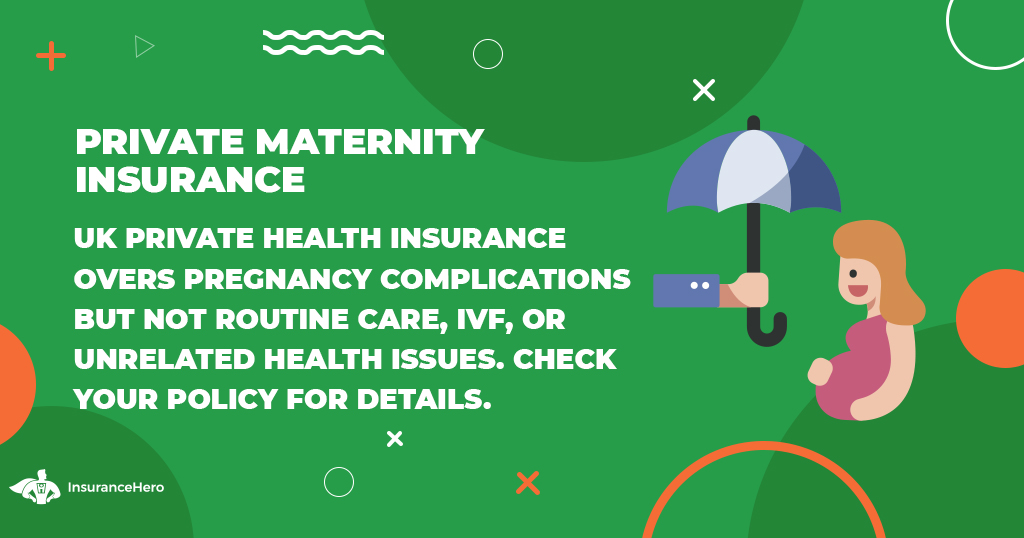
These policies may cover expenses related to emergencies or complications during pregnancy, such as c-sections, miscarriages, ectopic pregnancies, or gestational diabetes.
At the same time, it’s typically challenging to get coverage for things like IVF and fertility treatment, health conditions that aren’t directly connected to pregnancy (such as backaches or morning sickness), routine checkups, pregnancy classes, or obstetrician fees.
You might be able to find policies covering some of the above-listed pregnancy costs, but you must look closely at your policy before purchasing.
A close look at the fine print will allow you to understand what is covered and excluded.
Health Cash Plans
Health cash plans are not traditional health insurance but financial products that provide cash benefits to policyholders for various medical expenses, including maternity costs.
These plans typically provide a lump sum payment for maternity-related expenses, such as hospital stays, prenatal classes, or postnatal care. They can offset some of the out-of-pocket costs associated with maternity care.
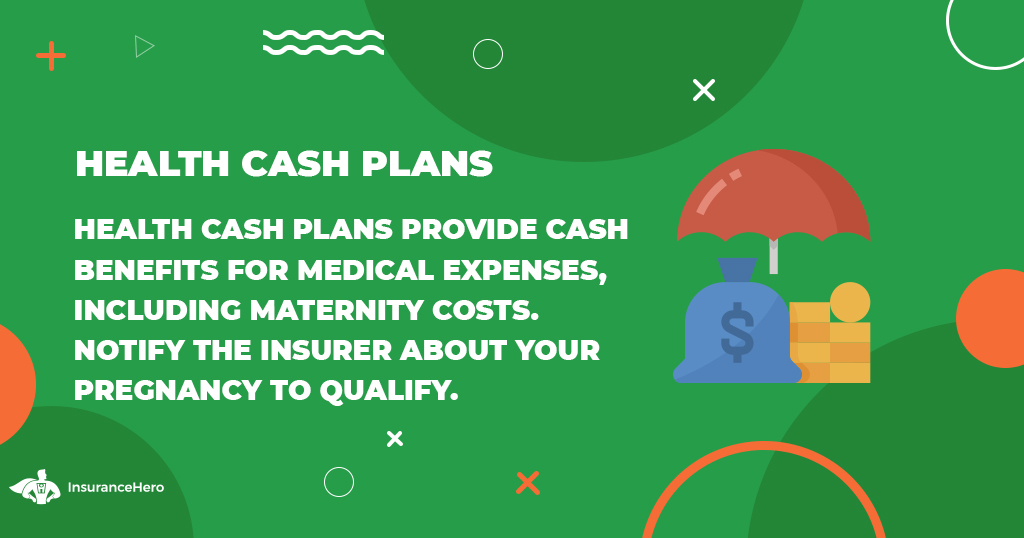
Sometimes, healthcare cash plans will pay a sum for each child you have. You typically need to let the insurer know ahead of time about your pregnancy to qualify.
Are you looking to Compare Insurance Quotes to Get the Best Rates?
Are you interested in investing in an insurance policy that will ensure your family has the financial support they need if you pass away?
Purchasing a life insurance policy can provide tremendous peace of mind, as your loved ones will be cared for no matter what.

At the same time, there’s no point in paying more for your life insurance policy than is necessary. If you’re looking to compare quotes from the top insurers in the UK to find the best deal, you’re in the right place.
At Insurance Hero, finding the best policy for your needs and budget is easy. If you’re ready to start, you can get your one-minute, no-obligation quote today.
Whilst the NHS provides top-notch maternity services, some might choose private health insurance for a few extra perks.
These private policies can give you access to private hospitals in London and elsewhere, more choice in healthcare providers, and might cover elective or non-standard procedures.
Private maternity cover could help with emergencies or complications during pregnancy, but it’s vital to check the small print.
Another option is health cash plans, which give cash benefits for various maternity-related costs.
Steve Case is a seasoned professional in the UK financial services and insurance industry, with over twenty years of experience. At Insurance Hero, Steve is known for his ability to simplify complex insurance topics, making them accessible to a broad audience. His focus on clear, practical advice and customer service excellence has established him as a respected leader in the field.


